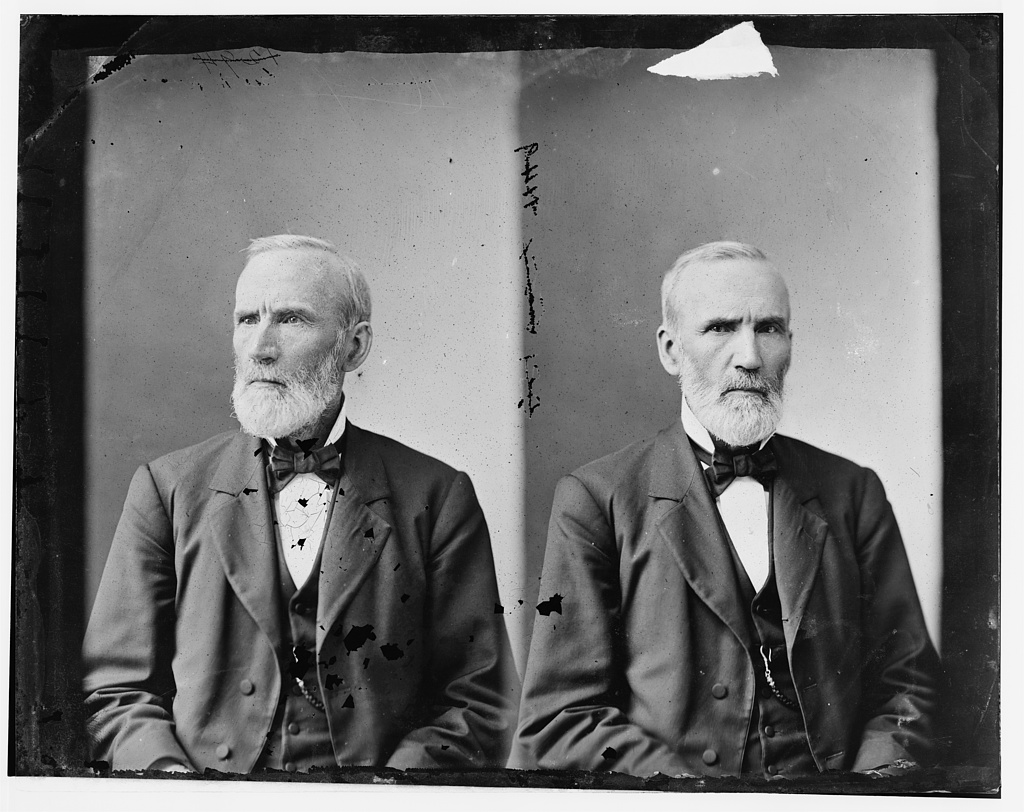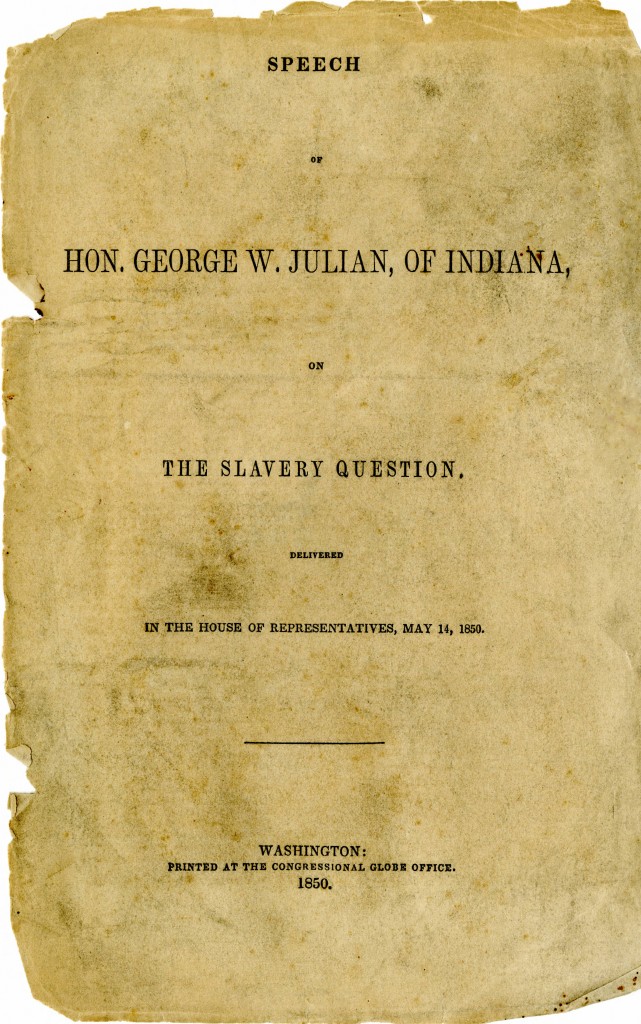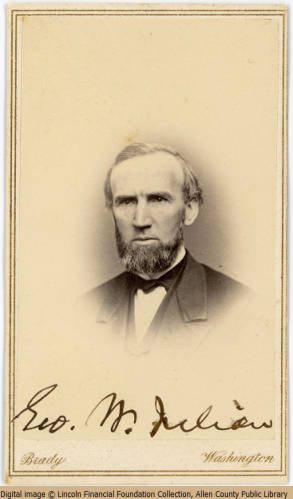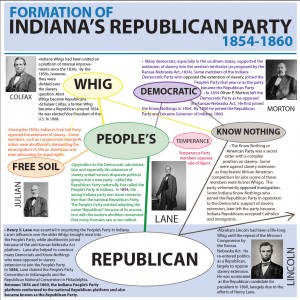
George Washington Julian was a radical political leader defined by his strong moral convictions. During a period marked by slavery, Civil War, monopolies, and discrimination against African Americans, immigrants, and women, Julian tirelessly advocated for abolition, equal rights, and land reform. He served as a U.S. representative from 1849-1851, served as an attorney in several fugitive slave cases in the 1850s (one which included a daring escape plan), ran for vice president on the Free Soil ticket in 1852, and again served as a U.S. representative 1861-1871.
Julian was born 1817 in Centerville (then called Centreville), Indiana. He resided there for most of his life and maintained a law practice. Julian was admitted to the Indiana bar in 1840 and practiced law when not serving in Congress. Julian worked within the legal system and various political parties to achieve goals shaped by his moral convictions. His commitment to abolition and equal rights (including equality in land distribution) remained remarkably consistent for over fifty years. In order to pursue reform in those areas, Julian often changed political parties, working with whichever party would advance these goals. He explained his position repeatedly throughout his career in his letters, articles, and speeches, including a description of his conversion to these causes in the Unitarian Review. In 1853 he wrote to fellow abolitionists, including William Lloyd Garrison, “you will not be blinded or disheartened by the irregular ebb and flow of political currents, or by facts which drift about upon their surface, but you will penetrate beneath it, to those great moral tides, which underlie, and heave onward, the political, the religious, and the whole framework of society.” While he modified arguments and approaches he never wavered from working toward equality. In the introduction to a collection of his Speeches on Political Questions [1872], he wrote that “while in a few instances opinions are advanced which have since been modified, my constant and inspiring aim was to declare what I believed to be the truth.” An examination of the table of contents to this collection of speeches shows that he constantly and consistently addressed abolition, equal rights, and land reforms, in Congress and throughout the country. Looking back on his career to 1884, Julian wrote in his Political Recollections [1884], “My triumph had no taint of compromise in it.”
United State House of Representatives, Thirty-First Congress
Julian took office in 1849 as U.S. Representative of the Fourth Indiana Congressional District, a largely Quaker and antislavery area based around Wayne County referred to as the “Burnt District.” Julian was a Free Soil Party leader, a single-issue party dedicated to opposing slavery extension, and later the institution of slavery itself. During his term, he supported legislation providing for abolition and equal access to public lands.
Julian gave several speeches in Congress advocating for the end of slavery and the repeal of the Fugitive Slave Act. His most poignant speech was likely “The Slavery Question” which he delivered to the House in 1850. He also frequently presented petitions from abolitionist citizens of states across the county where he spoke or attended meetings. In 1851, he presented petitions from citizens of Massachusetts for the repeal of the Fugitive Slave Act. Julian also presented a petition from Indiana Quakers “against the existence of slavery generally and particularly against the Fugitive Slave Law.” Julian then requested that the committee to which the petition was referred “report a bill for the repeal of the fugitive slave law.”

In 1851, Julian spoke to Congress about why he supported the Homestead Bill, which would distribute public land in limited quantities freely to settlers who would live on and improve their plot, or “homestead.” Julian argued that all people had an “inalienable” and “natural right” to make a home from the soil. He argued against the contemporary practice of providing large grants to companies and speculators who then required that people work for and rent from them. He referred to land monopolies in the North as “white slavery.” He used the opportunity to make a strong argument against slavery as well. He argued in front of Congress that the vast plantations of rich slave owners were not as productive as they would be if they were broken into plots held by individual owners. Julian said:
“The freedom of the public lands is therefore an anti-slavery measure. It will weaken the slave power by lending the official sanction of the government to the natural right of man, as man, to a home upon the soil, and of course to the fruits of his own labor. It will weaken the system of chattel slavery, by making war upon its kindred system of wage slavery, giving homes and employment to its victims, and equalizing the condition of the people.”
The bill failed in both the House and the Senate. According to historian James L. Roark’s 1968 article in the Indiana Magazine of History, Julian’s abolition argument may have hurt the bill’s chances of passing. Eleven years later however, after Julian’s return to Congress, the Homestead Act was passed.
Nomination for Vice-Presidency, 1852
The 1852 presidential election was mainly a contest between Whig candidate General Winfield Scott and Democratic candidate Franklin Pierce. The Free Soil Party, however was the strongest third party in the running, ahead of the Know-Nothings, Union, and Southern Rights parties. The Free Soil Party named founding member Senator John P. Hale of New Hampshire as their candidate and chose George Washington Julian as his running mate. The Free Soilers had little hope of winning. Most people were tired of the agitation around slavery issues and were satisfied by the Compromise of 1850, which temporarily neutralized the problem for many. However, for those morally opposed to slavery, a compromise was unthinkable and so they continued their political agitation for free soil. Wanting to maintain unity for the Union, most people voted for those candidates who supported the Compromise. The Hale-Julian ticket received only 155,825 votes out of over three million cast and no electoral votes. However, the Free Soil Party leaders, including Julian, went on to become essential in the establishment of the new Republican Party only two years later. After the loss, Julian returned to his law practice.

Fugitive Slave Cases
In 1850, Congress passed the Fugitive Slave Act , which not only prohibited Hoosiers from aiding escaping slaves but required them to return self-emancipated African Americans to their enslavers. Many opposed the law and challenged it in the courts. In the 1850s, Julian acted as a lawyer both for African Americans who were claimed as slaves and for those white Hoosiers who had helped slaves escape. According to Julian biographer Patrick W. Riddleberger, “after 1850 a lawyer in any of the states lying on the north shore of the Ohio River could, if he were so inclined, devote some of his practice to fugitive slave cases.”
In December 1854, Julian and E. H. Brackett acted as defense attorneys in a case against Benjamin Waterhouse, who was accused of harboring fugitive slaves named Tom and Jim. Tom and Jim allegedly escaped from Kentucky slave master Daniel Payne and travelled through Indiana to Canada. Waterhouse was found guilty of harboring the men while in Indiana. The law provided for a much harsher penalty, but due to Julian and Brackett’s efforts, Waterhouse served only one hour in prison and paid a $50 fine – a small success for those working to defeat the Fugitive Slave Act.
In December 1857, Julian served as an attorney in a complex set of related cases challenging the Fugitive Slave Act on behalf of an African American man, likely named West. A Kentucky slaveholder named Austin Vallandingham claimed that West was his slave and that he had escaped into Illinois. Vallandingham sent a slavecatcher to apprehend West. When the slavecatcher took West from Illinois, intending to bring him to Kentucky, they passed through Indianapolis. This gave Julian and other abolitionist lawyers an opportunity to challenge the Fugitive Slave Act and possibly aid West. The abolitionists tried several different tactics, and were involved in trials at the local and federal levels. They began by charging Vallandingham with kidnapping a free man. Indianapolis Judge William Wallace released West but he was immediately arrested by a U.S. marshal on charges from Vallandingham of being an escaped slave. Julian and other abolitionists now acted as West’s defense in a trial before U.S. Commissioner John H. Rea. Vallandingham was unable to provide official documentation of ownership and gave inconsistent testimony and evidence throughout the trial. Strangely, in an attempt to prove that West was indeed his slave, Vallandingham testified that he had cut off one of West’s finger joints — but West had no such injury. Among other tactics, the defense tried to delay the case, cited the Dred Scott Case, and argued that by bringing West into Indiana, where slavery was illegal, Vallandingham had unwittingly freed West. Despite their best efforts, the abolitionists were unable to help West. In his Political Recollections, Julian wrote, “After allowing secondary proof where the highest was attainable, and permitting hearsay evidence and mere rumor, the Commissioner [Rea] granted his certificate for the removal of the adjudged fugitive…” When the case was brought again to Judge Wallace, Julian explained that “under cover of an infamous law, and by the help of truculent officials, he [West] was remanded into slavery.”
When all hope of a fair outcome was lost, Julian and others sympathetic to West, attempted to plan his escape. Julian recalled:
“The counsel for the negro, with a dozen or more who joined them, resolved upon one further effort to save him. The project was that two or three men selected for the purpose were to ask of the jailer the privilege of seeing him the next morning and giving him goodbye; and while one of the party engaged the jailer in conversation, the negro was to make for the door, mount a horse hitched near by, and effect his escape… unfortunately [he] mounted the wrong horse…and when he saw the jailer in pursuit, and heard the report of his revolver, he surrendered, and was at once escorted South… This is the only felony in which I was ever involved, but none of the parties has any disposition whatever to confess it at the time.”
United State House of Representatives, Thirty-Seventh through Forty-First Congress
In 1854, Congress passed the Kansas-Nebraska Act which repealed the Missouri Compromise and allowed slavery into the U.S. Territories. The bill was sponsored by Illinois Democratic Senator Stephen Douglass and supported and signed into law by Democratic President Franklin Pierce. Opposition to the Democratic administration and especially the extension of slavery united various disparate political groups into a new party –called the Republican Party nationally, but called the People’s Party in Indiana. In 1854, the young Indiana party was more conservative than the national Republican Party. The People’s Party resisted adopting the name “Republican” because of its association with the eastern abolition movement that many Hoosiers saw as too radical. Henry S. Lane was essential in organizing the People’s Party in Indiana. Lane’s influence over the older Whigs brought most into the People’s Party, while abolitionists joined because of the anti-Kansas-Nebraska Act platform. A dynamic and popular speaker, Lane also helped to convince many Democrats and Know-Nothings who were opposed to slavery extension to join the People’s Party. With the goal of bringing as many people to the new party as possible, leaders maintained a moderate position in the 1850s, publicaly speaking against only the extension of slavery, not advocating for its abolition. Julian, however, was considered a Radical Republican as he opposed the institution itself and called for abolition.

In Indiana and nationally, many Republican leaders catered to the Know-Nothing members, but Julian vehemently opposed the nativist, xenophobic party. Julian believed that immigrants made the country stronger. In an 1855 speech delivered in Indianapolis, Julian said of immigrants:
“Let them come. Trodden down by kingly power, and hungering and thirsting after the righteousness of our free institutions, let them have a welcome on these shores. Their motive is a very natural and at the same time honorable one, — that of bettering their lot. They prefer our country and its government to every other. . . To proscribe him on account of his birthplace is mean and cowardly as to proscribe him for his religious faith or color of his skin. It is the rankest injustice, the most downright inhumanity”
Julian served as a delegate to the 1856 Republican National Convention, the first for the newly organized party. In 1860, Julian was again elected to the U.S. House of Representatives, this time as a Republican. The Goshen (Indiana) Times reported that Julian was elected by a “nearly 6,000 majority” and called him “one of the ablest men in the State.” Other newspapers complained that he was too radically abolitionist and would cause discord in the tentatively united and relatively new Republican Party where many were adamantly anti-African American despite being anti-slavery. Julian arrived in Washington D.C. February 1861, in time for the secession crisis. He opposed compromise measures that would have sacrificed the abolitionist cause to avoid secession. Julian disagreed with abolitionists who would have let the south secede, abandoning four million people into slavery.
During the Civil War, Julian served on the Joint Committee on the Conduct of the War which investigated management of the war and encouraged emancipation and employment of African Americans, first as laborers, and later also as soldiers, as means of winning the war. In an 1862 congressional speech, Julian argued: “In the battles of the Revolution, and in the War of 1812, slaves and free men of color fought with a valor unexcelled by white men. Are we afraid that a like honor to the colored man would be repeated, and thus testify against his enslavement?”
Throughout the Civil War, he worked to make clear that slavery was the cause of the war and that only complete freedom for all people would justify the losses caused by that war. In an 1862 speech to Congress printed in the Liberty (Indiana) Weekly Herald, Julian stated:
“Sir, the people of the loyal states understand . . . They know that slavery lies at the bottom of all our troubles. They know that but for this curse this horrid revolt against liberty and law would not have occurred. They know that all the unutterable agonies of our many battlefields, all the terrible sorrows which rend so many thousands of loving hearts, all the ravages and desolation of this stupendous conflict, are to be charged to slavery.”
According to Vernon Burton’s 2001 essay in A Companion to 19th Century America, “Despite the mountains of scholarship that has been produced, no consensus exists on the causes or consequences of the war, except that all serious historians credit slavery as its underlying root.” Julian and other Radical Republicans were ahead of their time in recognizing slavery as the main cause of unrest and war. Once abolition was achieved Julian worked toward rights for African Americans and women, especially that of suffrage. He also fought for the common person’s right to hold land, standing up to large railroad companies that were taking public lands for private use. However, he did see a shift in attitude in his own lifetime. Julian wrote in his Political Recollections, “step by step I saw my constituents march up to my position” and accept that ending slavery was essential to moving forward as a democratic nation.
Julian argued in Congress in support of the Homestead Act in 1862 as a measure to benefit the Union. By this time, land appropriation by railroads, capitalist groups, and speculators had increased and a more effective homestead measure was called for by Republicans. Julian spoke during the debate, advocating for homesteading as the best way to bring money to the Union and repay the nation’s debt to it’s soldiers, black and white. Lincoln signed the Homestead Act May 20, 1862. Julian stated that its passage was “a magnificent triumph of freedom and free labor over the slave power.”
Julian also supported the Second Confiscation Act of 1862 which would confiscate all property from rebels and redistribute it as homesteads for people who had aided the Union – including African American soldiers and laborers. He championed bringing homesteading to the South to break up the plantations, thus destroying both the aristocracy and the land monopolies. Julian furthered his ideas on abolition and land confiscation during a debate in Congress in 1862. He stated that the war was a fight to end slavery and demanded “instant, decisive, defiant action” to emancipate enslaved people (not just a proclamation of emancipation). His plan included: arming freedmen, confiscation of all rebel property, and redistribution of plantation land to freedmen. Redistribution of rebel lands to freedman became one of Julian’s main concerns during the war.
Julian was appointed Chairman of the Committee on Public Lands in December 1863. For the next eight years he used this office to work to combine abolition (later reconstruction) and land reform. Julian presented a sweeping land reform bill to Congress March of 1864, that would redistribute millions of acres of southern land to soldiers and freedmen, a repeal of the joint resolution of the previous year. Julian argued for homesteads for black soldiers in Congress:
“They have enlisted in the service of their country; they are enduring all the perils and hardships of war; they are helping by their valor achieve our victories and save the nation from impending destruction; they are to-day covering themselves with glory under General Grant, in driving back General Lee and his legions . . . Why would [one] . . . refuse to grant them, at the end of the war, a home on the land of their oppressors, who have enslaved their race for more than two hundred years, and at last sought both their lives and the life of the Republic?”
The bill narrowly passed the House May 12, 1864, but before it reached the Senate, the Attorney General ended confiscation. In 1866 Congress passed Julian’s Southern Homestead Bill which gave 50,000,000 acres of public land in the South to homesteaders.
In 1865, Julian argued for suffrage rights for southern blacks. In a speech to Congress, Julian advocated for “the immediate bestowal of the elective franchise on all loyal men of the South, irrespective of color.” According to the Union City (Indiana) Eagle, “Not alone from motive of philanthropy or of exclusive justice to the black man — by the aid of whose blood and toil the rebellion had ultimately prostrated — was this urged, but also from the consideration that the best interests of the entire country, and especially the salvation of the Sothern States, demanded it.” The Indiana State Sentinel reported that Julian made a speech in Muncie in which he said the people of Indiana will have to decide on negro suffrage, not Congress but that he “fully committed himself to the principle of universal suffrage.” While Julian believed in universal suffrage, he worked to achieve the vote for southern blacks first as it was more likely to be granted because northerners worried about southern leaders returning to power. Julian recalled this suffrage campaign in his Political Recollections:
“My task was an arduous one, but I found the people steadily yielding up their prejudices, and ready to lay hold of the truth when fairly and dispassionately presented… The question involved the welfare of both races … not merely the fate of the negro, but the safety of society. It was, moreover, a question of national honor and gratitude, from which no escape was morally possible. To leave the ballot in the hands of the ex-rebels, and withhold it from these helpless millions, would be to turn them over to the unhindered tyranny and misrule of their enemies…and making the condition of the freedmen more intolerable than slavery itself through local laws and police regulations.”
According to the House Journal and Congressional Globe, Julian proposed a constitutional amendment to Congress December 8, 1868 (H.R. 371). The bill was ordered to be printed, but does not appear with the other Bills and Resolutions of the 40th Congress. According to Julian’s Political Recollections, the amendment read: “the right of suffrage in the United States shall be based on citizenship, and shall be regulated by Congress… all citizens of the United States whether native or naturalized shall enjoy this right equally, without any distinction or discrimination whatever founded on race, color or sex.” After the resolution was voted down, Julian attempted to make further inroads for women’s suffrage by presenting more targeted bills, including House Resolution 1530 which would have given the women of the District of Columbia the right to vote, and House Resolution 1531 which would have provided women in the territories with the right to vote. He continued this tactic for the rest of his term in the House. According to the House Journal and the Congressional Globe, Julian introduced another resolution (H. R. 15) during the 41st Congress, First Session, proposing a constitutional amendment granting universal suffrage in the next Congress, which he modeled after the recently passed Fifteenth Amendment. Women were not granted the right to vote until Congress passed the Nineteenth Amendment in 1920.
Julian slowed the pace of his work only slightly after he left Congress in 1871. He moved from his long-time home in Centerville to Irvington (Marion County) in 1873. (Julian’s home in the Irvington Historic District still stands). By this time he had become disillusioned with the corruption of the Grant administration, and drifted from the Republican Party to a tentative commitment to the Liberal Republican movement which was working for civil service reform. Julian represented Indiana at the Liberal Republican Convention of 1872 where the other delegates put his name forward as a vice-presidential candidate, but he did not receive the nomination.
At the 1872 Democratic Convention, Julian’s name was put forward as a congressional candidate. While this may seem strange, there are several reason Julian would have been amenable to this proposal. Again, there was his dissatisfaction with the Republican Party, but also Julian had changed his views on southern Democrats drastically. While he called for their punishment immediately following the war, he now felt that the 14th and 15th Amendments had settled the war and the goal should be peace, amnesty, and unity. In many ways, he naively though that his work for equal rights for African Americans had been successful and accomplished. The Liberal Republicans were overwhelmingly defeated in 1872 and Julian moved further toward the Democratic Party. By 1876 he actively campaigned for the Democrats, while stressing his role as an independent voter and political parties as temporary organizations useful only as long as they work for specific goals. Still claiming his independence, Julian campaigned for the Democrats in 1880 and 1884. In 1885 Julian took public office for the last time in his life. President Grover Cleveland appointed him Surveyor General of New Mexico as a reward for his service to the party. He served until 1889, dealing mostly with land claims. In 1889 he moved back to Irvington where he lived relatively privately and quietly until his death in 1899. He is buried at Crown Hill Cemetery.
